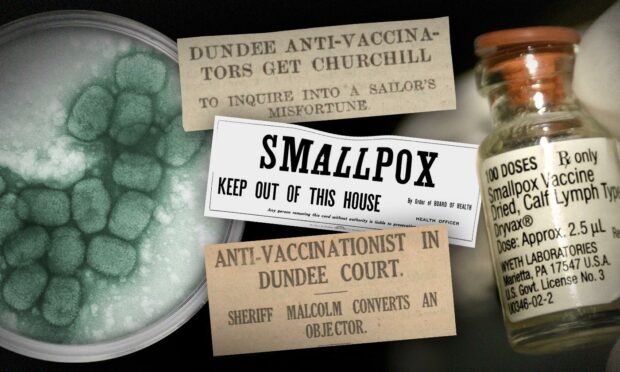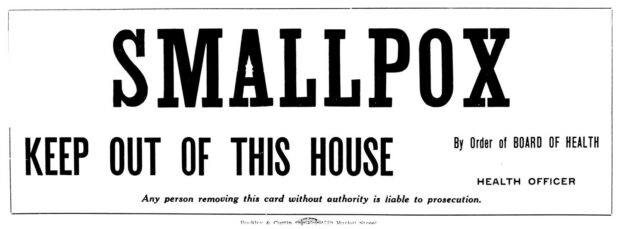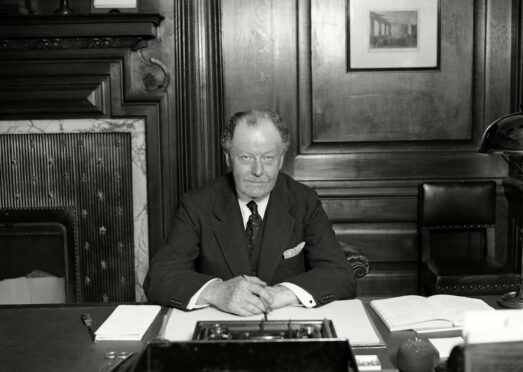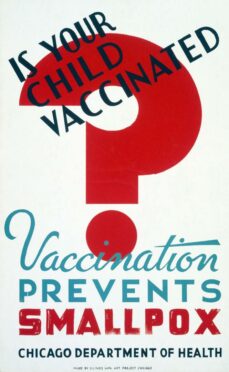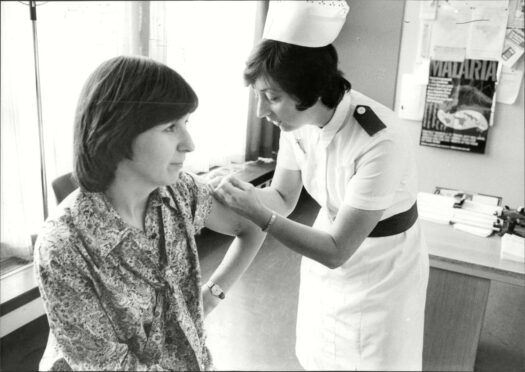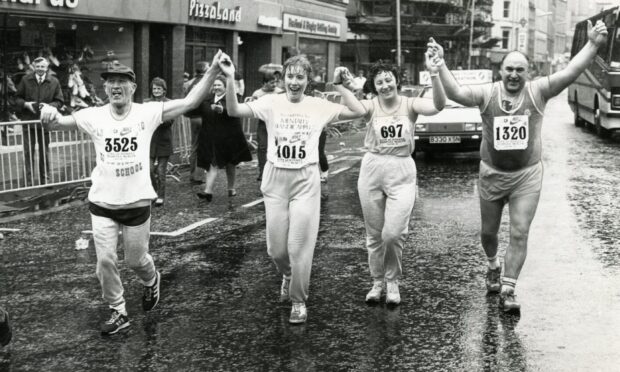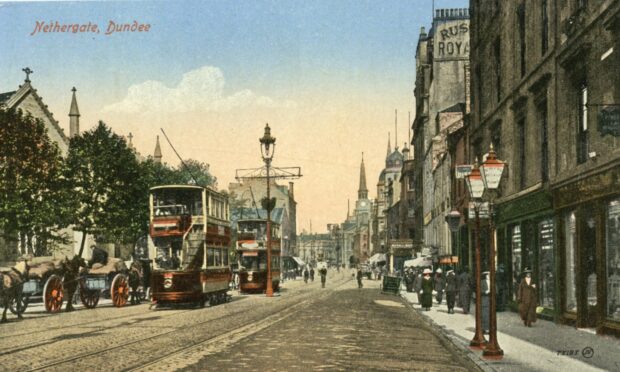Covid vaccination passports could be the key to a ‘normal’ Christmas this year, but historically this is nothing new in Scotland – at least not in Dundee.
The contemporary scheme has proved controversial, particularly among those who do not wish to be vaccinated.
But the backlash to Covid passports mirrors a similar backlash to smallpox vaccine certification in the early 20th Century.
At that time, people could be hauled into court if they could not prove the smallpox vaccination status of their children – a fate that befell many Dundee parents in the 1920s.
Dundee was plagued on and off by outbreaks of smallpox from the 1860s onwards, often brought back to the city by seafarers.
Smallpox was an incredibly infectious, unpleasant and deadly disease.
Symptoms included acute fever, fatigue, headaches, vomiting, blistering lesions and a rash – and it often proved fatal in infants.
Smallpox in Dundee
There were well-documented outbreaks of smallpox in Dundee from Victorian times up to the 1940s.
A temporary smallpox hospital was built by Dundee Town Council on Clepington Road in 1867 and later extended to accommodate typhoid patients.
But the city was particularly badly affected by outbreaks of smallpox in 1927 and 1928.
A Royal Society of Medicine report detailed infections in the city of smallpox minor, the milder of two strains.
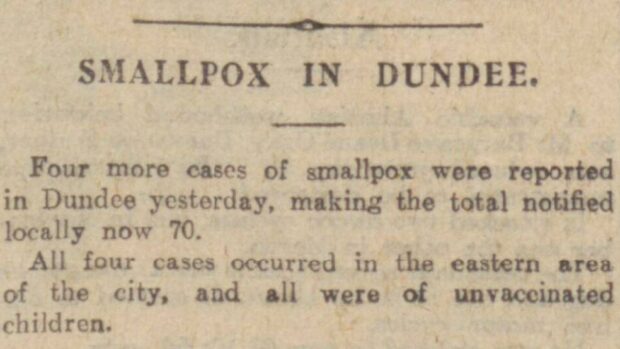
It read: “Both epidemics were prolonged and included large numbers of cases.
“Apart from the high fatality rate in unvaccinated infants, the fatality rates in each age-group over one year were remarkably constant.
“The proportion of deaths in age-groups by vaccinal states showed mainly deaths of vaccinated persons under the age of 15 and mainly deaths of unvaccinated persons over the age of 15.”
It was found that between 1918 and 1939 the rate of children vaccinated against smallpox had dropped from 70.5% in 1920 to 42.2% in 1938.
There was such concern over the Dundee outbreak in 1927, although the more minor strain, that it was discussed in the House of Commons.
Sir John Gilmour, Secretary of State for Scotland, was asked to explain precautions being taken to limit the spread of the disease which had taken hold in the east end of the city.
He told Parliament: “Doctors, inspectors and nurses are carrying out a house-to-house visitation in the infected area, to keep the outbreak under control, and cases of contact are removed to a reception house or kept under daily medical observation in their homes.
“Centres have been established at which anyone may be vaccinated at any hour of the day within reasonable distance of his residence, and arrangements are being made for the vaccination of the staffs of workplaces and the inmates of institutions.”
Anti-vaccination league
Huge efforts were made to curb the disease in Dundee – this was despite smallpox vaccination already being compulsory for children in Scotland under the Vaccination (Scotland) Act 1863.
There was a fine or even jail for parents who failed to have infants vaccinated by the age of six months, and the act gave parish authorities the power to prosecute those flouting the law.
Many chose not to on religious grounds or fears over side-effects, often encouraged by the National Anti-Vaccination League which had a very active Dundee branch.
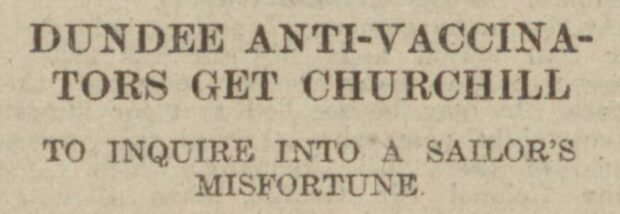
The branch even wrote to Winston Churchill in 1913 when he was First Lord of the Admiralty to raise concerns about vaccinating sailors.
They referred to the case of Henry Plant, a Dundee mariner whom they claimed lost his arm after being vaccinated.
Churchill’s office swiftly slapped down the concerns, and responded: “The First Lord has gone into the case of Henry Plant, which has been most carefully examined, and there is no possibility of doubt that his illness was not the result of vaccination.”
Many people have chosen not vaccinate themselves or their children against Covid for a variety of reasons.
Some are vehement anti-vaxxers, while others are worried about potential side effects.
These days it is down to personal choice and not a decision that will result in a criminal record, but it was a very different story for parents in the past.
There was such a high volume of parents unwilling to vaccinate their children in Dundee at one point during the city’s smallpox outbreak in 1927-28, that the Scottish Board of Health intervened.
The body wrote to the parish council asking what they were prepared to do with “the large number of vaccination defaulters in the district”.
Vaccine certificates
The answer was to make examples of them. In July 1928, a number of anti-vaxxers were hauled into the dock to appear before Sheriff Malcolm at Dundee Sheriff Court.
Alfred Thomson, a millworker, was charged with failing to give the parish registrar a certificate of vaccination for his child.
He pleaded not guilty and told the judge he still did not want to have his child vaccinated, despite an ongoing smallpox outbreak in Brechin.
Mr Thomson said he was a conscientious objector and did not believe in vaccination, but the threat of a large fine quickly changed his views.
The next to appear was labourer John Garty, who had been summoned for the seventh time over his 14-year-old daughter for whom he could not provide a vaccine certificate.
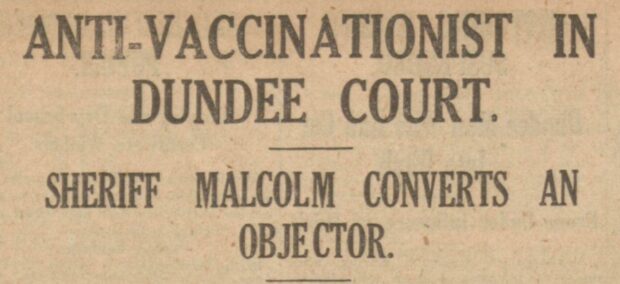
He claimed she had been vaccinated and brought her to court as evidence to show the sheriff marks on her arms “like two bob bits”.
The parish registrar claimed that although Garty’s other children were vaccinated, his daughter was working, her father had refused a vaccination and could not provide a certificate.
Garty was fined 10 shillings with £1 2s 6d of expenses, and when leaving the court shouted: “You will have my nine kiddies to keep until I come out!”
His appearance was followed by another three men including Luigi Zaccarini who was fined 15 shillings, with an additional 17 shillings of expenses.
The sheriff was urged to make an example of Mr Zaccarini as he had three unvaccinated children.
Prison for one anti-vaxxer
But not everyone accepted a fine. James Kay, a carter from Lochee, refused to have his child vaccinated and also refused to pay a penalty.
He was fined 15 shillings with £1 2s 6d of expenses and asked if he would like 14 days to pay it.
He told the sheriff: “I do not wish 14 days to pay. I will go to prison. I could be doing with £1 17s 6d.”
After 10 days in prison he was brought back to the witness box, but refused to take the oath and told the court “I do not believe in gods of any kind”.
He then revealed that while behind bars, his wife had secretly had his children vaccinated, otherwise he still would not have allowed it.
The sheriff told Kay he had been “obstinate to the last minute”.
Compulsory smallpox vaccination was abolished after the Second World War, but the immunisation programme continued around the globe.
The last recorded case of smallpox in Britain was one in which medical photographer Janet Parker died after being accidentally exposed to the virus in a laboratory in 1978.
But by 1980, the World Health Organisation declared that smallpox had been successfully eradicated globally.
It is still considered one of the great triumphs of medicine and of the 20th Century.
If you enjoyed this, you might like:
